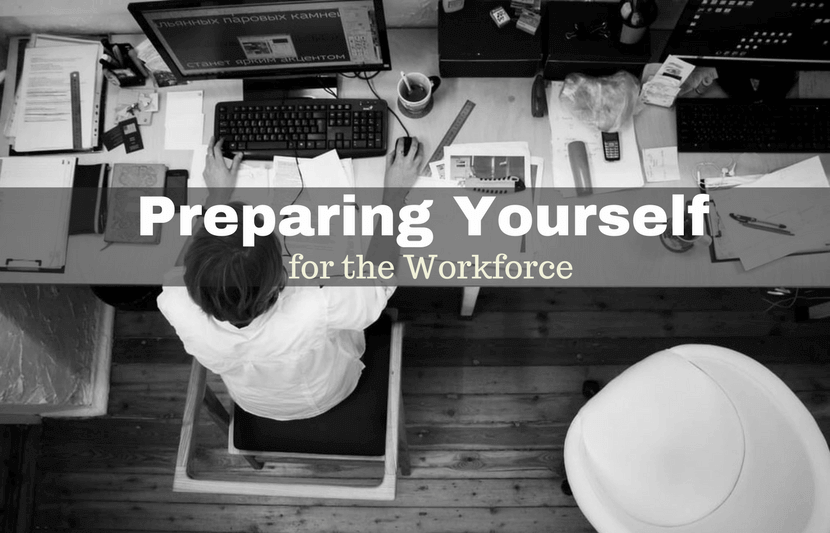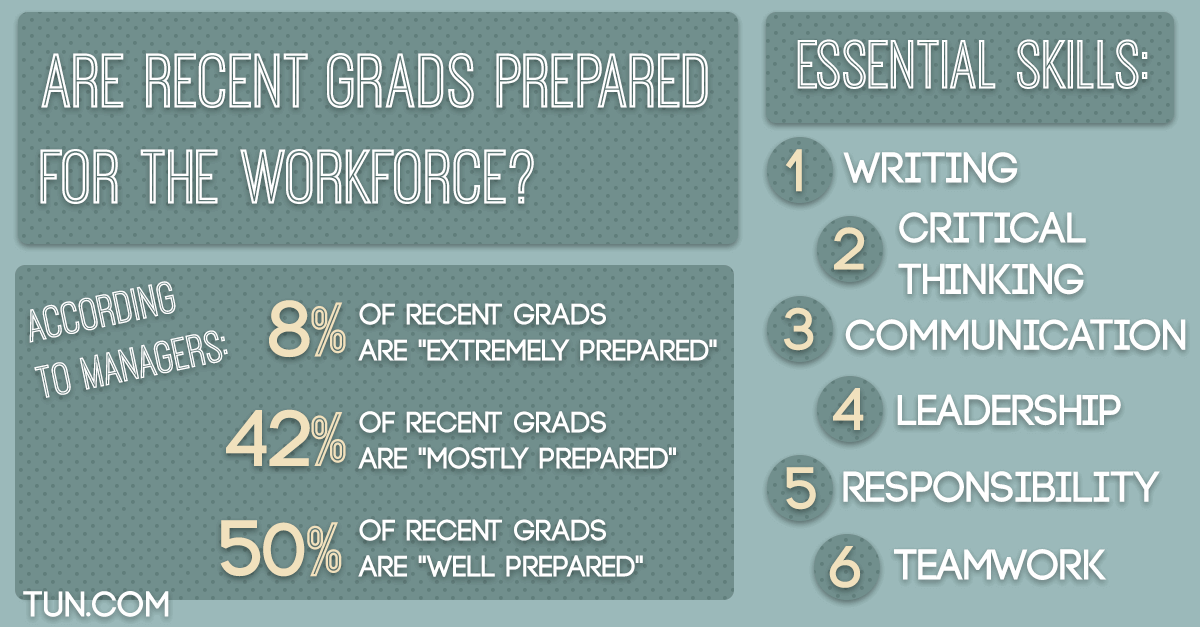Do you feel prepared for the workforce after graduation? If your response is “Yes!”, you may be surprised to find out that the majority of employers have the opposite view. Just take a look at a 2016 survey by PayScale:
- 25% of recent grads consider themselves “extremely prepared” for a job, but only 8% of managers agree.
- 62% of students believe they are “mostly prepared,” but only 42% of managers agree.
- 87% of graduates say they are “well prepared,” but only 50% of employers seem to agree on that.
Yikes!
Does it mean your college is failing to equip you with the necessary knowledge and skills? Not exactly. To enter the workforce, a student needs both education and other skills that you may not be learning in college.
In plain English, your college teaches hard skills – techniques to use in programming, marketing, design, or whatever your profession requires. However, you may need to hone your writing skill and soft skills, aka social intelligence and personal traits enabling you to co-exist with peers successfully..
Here are some essential skills you need to develop while in college.
1) Writing
Aside from essays assigned in college, most students limit their writing to brief text messages and Snapchat conversations that do little to improve their writing proficiency. If you are not a good writer, you may not even pass the recruiting stage, as HR managers will likely reject the resume or cover letter with tons of spelling and grammar mistakes. If you pass the recruiting stage, your lack of writing skills will show in your business correspondence and likely impede your career.
If you are not a good writer, don’t lose heart. You can hone your writing skills by taking various writing courses, such as creative writing, professional and technical writing, critical reading and writing, etc. There are plenty of online courses and writing apps, so you can learn on your own time.
2) Critical Thinking
Since 60% of employers claim that graduates don’t have problem-solving and critical thinking skills, it is imperative that you develop these skills. Critical thinking is defined by The Critical Thinking Community as “the intellectually disciplined process of actively and skillfully conceptualizing, applying, analyzing, synthesizing, and/or evaluating information gathered from, or generated by, observation, experience, reflection, reasoning, or communication, as a guide to belief and action.” What does it all mean?
To put it simply, you should be able to analyze, synthesize and evaluate information to understand things and make better decisions on that ground. Ransom Patterson lists 7 ways to improve critical thinking skills:
- Asking basic questions;
- Question basic assumptions;
- Be aware of your mental processes;
- Try reversing things;
- Evaluate the evidence;
- Remember to think for yourself; and
- Understand that no one thinks critically 100% of the time.
3) Communication
It sounds counterintuitive, but 46% of career professionals say that graduates lack basic communication skills, which are so crucial for success at work. These skills are not taught in classrooms, but you can learn/improve on your own.
Try these steps:
- Listen to others and don’t interrupt people when they talk.
- Remember that body language is also communicating what you think.
- Develop empathy.
- Learn to speak clear and concisely.
- Get rid of conversation fillers: your um’s and ah’s are nothing but communication killers.
4) Leadership
While 63% of millennials want to be leaders at work, the PayScale study shows that 44% of managers report a lack of leadership qualities in recent graduates.
Here are some ways to develop leadership skills:
- Find your passion.
- Set clear goals.
- Know your strengths and learn from failures.
- Be a leader outside of college.
- Take online courses on building leadership.
5) Responsibility
All managers need responsible employees, and if you don’t have it in you – things look blue. Responsible behavior develops character, builds meaningful relationships, and allows you to get ahead at work.
How does one learn to be responsible? You learn to be responsible by taking on responsibilities, so:
- Stop blaming others for your problems.
- Don’t complain or play a victim.
- Admit your mistakes, and try to accept what you can’t control.
- Practice self-discipline.
- Be consistent and reliable.
- Learn to manage time and money.
In other words, behave as an adult and accept responsibility for your own actions/inactions.
6) Teamwork
According to PayScale, 36% of managers believe recent graduates lack teamwork skills. If you want to collaborate successfully, you need to learn to work effectively with others. You can do that by:
- Getting to know your peers better and demonstrating support for them.
- Being open-minded, listening to others, and discussing ideas with your peers.
- Focusing on “What can we learn?” rather than “Whom to blame?” approach.
- Being positive and encouraging, and motivating others to act.
Let “Listen, Respect and Participate” be your motto.
Now that you know that so many of these skills are essential for the workforce, you should take the time and effort to develop these skills and work your way towards a successful career.
[divider]
RELATED ARTICLES
- The Interview: What to Say and What to Leave Out
- How to Land Your Dream Internship
- The Millennial Rolodex: Networking Through LinkedIn
- The Interview: What to Say & What to Leave Out
- 3 Things To Seriously Consider Before Saying YES to a Job
- How to Make Job Offers Come Your Way
- How to End Up With A Job You Love




